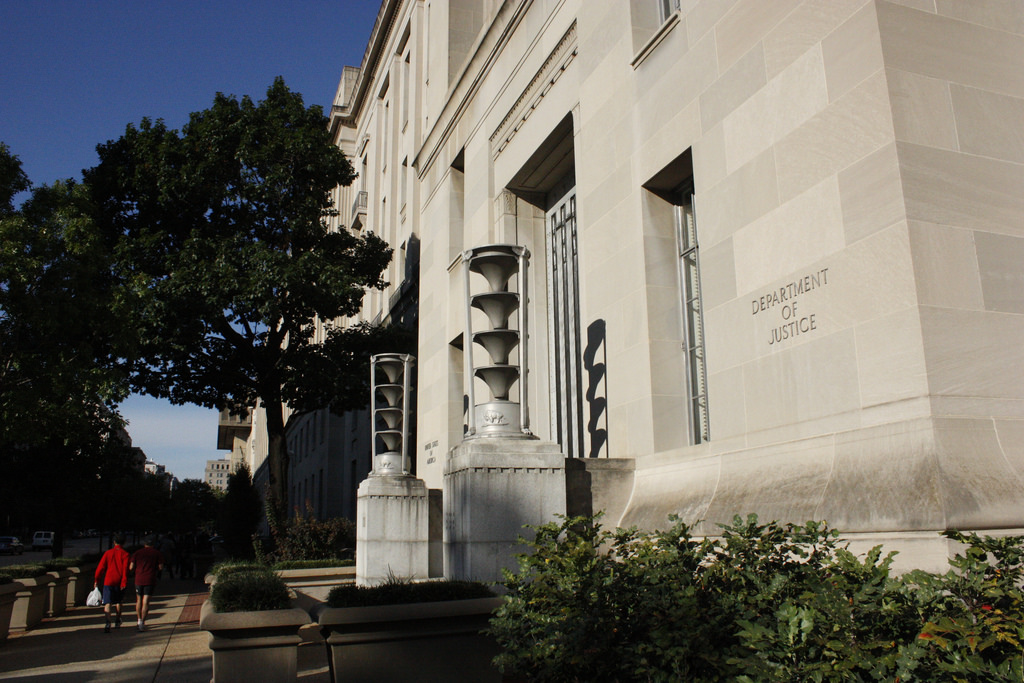The President Is Still Subject to Generally Applicable Criminal Laws: A Response to Barr and Goldsmith
In an op-ed in the New York Times and a post on Lawfare, we criticized President Trump’s nominee to be the next attorney general, William Barr, for a memo he sent to Trump administration officials last June arguing that Special Counsel Robert Muell

Published by The Lawfare Institute
in Cooperation With

In an op-ed in the New York Times and a post on Lawfare, we criticized President Trump’s nominee to be the next attorney general, William Barr, for a memo he sent to Trump administration officials last June arguing that Special Counsel Robert Mueller should not be allowed to “interrogate” the president about allegations of obstruction of justice. Jack Goldsmith has responded to our op-ed and blog post with a post of his own that offers a “qualified defense” of Barr’s memo. “Barr’s views, far from crazy, have significant support in Supreme Court case law and executive branch precedent,” Goldsmith writes.
We disagree. Taken at face value, Barr’s arguments would render the president immune from liability for a wide range of clearly criminal acts. The Supreme Court has not endorsed Barr’s views, and we expect that most readers will recoil at their implications. Goldsmith’s post is perhaps the best defense that can be mustered for Barr’s position on presidential immunity from obstruction liability, but we continue to believe that Barr’s stance is both radical and wrong.
* * *
Barr’s memo says that “statutes that do not expressly apply to the President must be construed as not applying to the President if such application would involve a possible conflict with the President’s constitutional prerogatives” (emphasis in original). Barr says this principle is “well-settled,” and Goldsmith agrees. But this statement of supposedly “well-settled” law requires quite a bit of unpacking, and once unpacked, it cannot support the conclusions Barr draws.
As a preliminary matter, it’s not clear what Barr means when he refers to “statutes that do not expressly apply to the President.” Is he referring to all statutes that don’t specifically mention the office of the president—what might be characterized as a “magic words” rule? If so, then that would cover almost every federal criminal law, because there are only a handful of criminal provisions (e.g., 18 U.S.C. § 607) that specifically say they apply to the president. Or is Barr referring only to instances in which a fair-minded reader, applying general principles of statutory construction, would conclude that it is ambiguous whether the statute applies to the president—what we might call a “genuine ambiguity” rule? If so, then Barr’s “express application” claim is merely a reflection of the uncontroversial principle that ambiguous statutes should be construed so as to avoid serious constitutional questions.
The Supreme Court case that Barr cites for this “express application” principle—Franklin v. Massachusetts—appears to involve a statute of the latter sort. The question in Franklin was whether the president is an “agency” for purposes of the Administrative Procedure Act. The APA defines “agency” to mean “each authority of the Government of the United States”—and the word “authority,” depending on the context, can refer to individuals or entities. The Supreme Court concluded that the statute was sufficiently ambiguous that, “[o]ut of respect for the separation of powers and the unique constitutional position of the President,” it would construe the APA as not applying to the chief executive. But the Supreme Court never said that in order for a statute to cover the president, Congress must mention the president specifically.
Goldsmith’s post mentions other Supreme Court cases that ostensibly support Barr’s “express application” principle: Public Citizen v. Department of Justice, French v. Weeks, Sale v. Haitian Centers Council, Tenney v. Brandhove, and Nixon v. Fitzgerald. None of these cases endorse the “magic words” version of the “express application” rule. Public Citizen involved a statute, the Federal Advisory Committee Act, that actually does mention the president specifically. The question there wasn’t about whether FACA applies to the president (it very clearly does); the question was about the meaning of the word “utilize.” The statute in French likewise applied to the president specifically; the question there was whether the president could delegate his power under the statute to the secretary of war. Sale involved a statute that, on its face, applied only to the attorney general; the court declined to stretch the statutory language to cover the president too. Tenney wasn’t about the president at all—the question there was whether a provision of the Civil Rights Act of 1871 applied to members of the California Senate. Nixon v. Fitzgerald is the closest to being on point, but the question there was about the scope of the president’s common-law immunity from civil damages—not an issue of statutory interpretation—and by its own terms, the court’s holding “merely precludes a particular private remedy” in lawsuits against the president.
As for the federal obstruction of justice statutes: A fair-minded reader, applying general principles of statutory interpretation, could not conclude that there is any ambiguity as to whether they apply to the president. Most relevantly, 18 U.S.C. § 1512(c) says that “[w]hoever corruptly … obstructs, influences, or impedes any official proceeding, or attempts to do so, shall be fined … or imprisoned not more than 20 years, or both.” There is no way to read “whoever” in Section 1512(c) to mean “whoever except the president.” So for Barr’s “express application” principle even to apply to Section 1512(c), he must have in mind the “magic words” version which the Supreme Court has never adopted.
Even if the “magic words” version is a valid interpretation of the Supreme Court’s cases (which we don’t think it is), it still wouldn’t lead to Barr’s conclusion. Assume—solely for the sake of argument—that statutes that do not specifically mention the president “must be construed as not applying to the President if such application would involve a possible conflict with the President’s constitutional prerogatives.” One possible interpretation of that claim is as follows: “If statute X does not specifically mention the president, and if applying statute X to the president would in some circumstances involve a possible conflict with the president’s constitutional prerogatives, then statute X must be construed as not applying to the president.” We call this the “statute-specific view.”
The statute-specific view yields absurd results. It would mean, among other things, that the president could literally get away with murder. It’s not hard to imagine cases in which applying the murder statute to the president would involve a possible conflict with the president’s power as commander-in-chief. (Say, for example, that the president orders an FBI raid that he claims is justified on national security grounds but that he knows will also result in the death of a domestic political rival.) So under the statute-specific view, the murder statute is a statute whose application to the president would in some circumstances involve a possible conflict with the president’s constitutional prerogatives. And since the federal murder statute doesn’t specifically mention the president, that would render the president immune from liability for murder even if he gunned down an estranged lover in broad daylight on the National Mall.
As best we can tell, Barr does not subscribe to the statute-specific view. His memo acknowledges that the obstruction statutes can apply to the president in limited circumstances, even though the application of the obstruction statutes to the president under other circumstances would involve a possible conflict with the president’s constitutional prerogatives. What Barr seems to have in mind is the following: “If statute X does not specifically mention the president, then it must be construed as not applying to the president in circumstance C if applying statute X to the president in circumstance C would involve a possible conflict with the president’s constitutional prerogatives.” We call this the “circumstance-specific view.”
This argument may appear less radical, but it holds up no better. The first problem with the circumstance-specific view is in specifying the relevant “circumstance” with the appropriate level of generality. For example, consider whether the president can be held liable for obstruction of justice when he tries to shut down an FBI investigation into ties between his campaign and a foreign government. Is the relevant circumstance “shutting down an FBI investigation”? Or is it “shutting down an FBI investigation into ties between the president’s campaign and a foreign government”? Or is the relevant circumstance case-specific (i.e., “shutting down an FBI investigation into ties between the 2016 Trump campaign and Russia”)?
Barr’s memo suggests that the relevant circumstance encompasses all “facially-lawful actions taken by the President in exercising the discretion vested in him by the Constitution.” His view appears to be that any statute that does not specifically mention the president must be construed as not applying to facially lawful exercises of presidential power. By “facially-lawful,” Barr explains that he is referring to actions that would not be criminal but for the president’s “subjective state of mind” at the time. Barr warns of “potentially disastrous implications” if “a President can be accused of committing a crime based solely on his subjective state of mind.”
As our Lawfare post explained, the “facially-lawful” formulation yields results almost as absurd as the statute-specific view. We gave the hypothetical example of President Clinton appointing Monica Lewinsky ambassador to Switzerland so as to get her to lie under oath. Surely, it would have been facially lawful for Clinton to name Lewinsky as ambassador to Switzerland if his motives were pure. Clinton’s appointment of Lewinsky is only criminal—in our (counterfactual) example—because of his subjective state of mind at the time of the appointment. Would Barr’s theory let Clinton (hypothetically) off the hook?
Goldsmith says that he is “confident that Barr has a good answer to this hypothetical, probably along the lines that it involves a facially unlawful act (suborning perjury).” But that answer would be at odds with Barr’s own words, as it depends entirely on Clinton’s “subjective state of mind” (which Barr insists is irrelevant). Again, it’s not facially unlawful for the president to appoint his former lover to an ambassadorship. The only illegality on the president’s part in our hypothetical arises because of the reason why Clinton appointed Lewinsky to the ambassadorship—i.e., the president’s subjective state of mind at the time of the appointment.
Here’s another hypothetical: Last week, federal prosecutors charged the powerful Chicago alderman Ed Burke with extortion. Imagine if, several weeks before the indictment, Burke had communicated a message to President Trump (who incidentally, was formerly a client of Burke’s private law firm) in which Burke promised to pay Trump $1 million if the president got the FBI to drop its investigation of the alderman. And let’s say, again hypothetically, that the president intervened to end the investigation but was caught before he could collect on the bribe.
Could the president be held criminally liable under those circumstances? Well, neither the bribery nor the obstruction statutes specifically mention the president. And telling the FBI to drop an investigation is, according to Barr, a “facially lawful” act. Goldsmith asks why we “make such a fuss about” bribery given that Barr never mentions bribery in his memo. The reason is that even the Office of Legal Counsel—which takes a consistently and sometimes extraordinarily broad view of presidential power—acknowledges that the bribery statute applies to the president, and Barr’s memo appears to imply otherwise.
Yet despite the near-consensus that the bribery statute applies to the president, and despite the fact that bribery often turns on the actor’s subjective state of mind, past presidents have not been mired in endless bribery investigations. Why not? For one thing, most presidents—to the best of our knowledge—have not sought bribes. And the Justice Department generally does not initiate an investigation into a current or past president unless it has some reason to believe that he committed a crime. If it did, it would have to contend with the high standard of proof for criminal liability—not to mention other procedural and substantive roadblocks on the way to prosecuting the president. To be sure, any presidential appointment could—depending upon the president’s subjective state of mind at the time—potentially violate the bribery statute. But has this produced the “potentially disastrous implications” that Barr’s memo predicts? Pretty clearly not.
So too with obstruction of justice. Most of the time, the president need not worry about obstruction liability when he issues directives to his attorney general and other law enforcement officials. Occasionally, hard cases will arise, and the application of the obstruction statutes to the president will involve difficult judgment calls on the part of prosecutors, courts, and—potentially—jurors. (Note that even if the president cannot be indicted while in office, he certainly can be prosecuted for actions taken while he was president.) Elsewhere, we have argued that obstruction liability should be limited to cases in which the president is not plausibly acting to “faithfully execute” federal law but is instead seeking to advance his own narrow personal, partisan, or pecuniary interests. Reasonable people may take a somewhat broader or somewhat narrower view of the president’s potential obstruction liability than we do. But Barr’s view—which would carve out a broad swath of criminal law from which the president would from now on be immune—goes beyond the range of reasonable disagreement that the Senate ought to tolerate when confirming an attorney general nominee.



.png?sfvrsn=48e6afb0_5)


